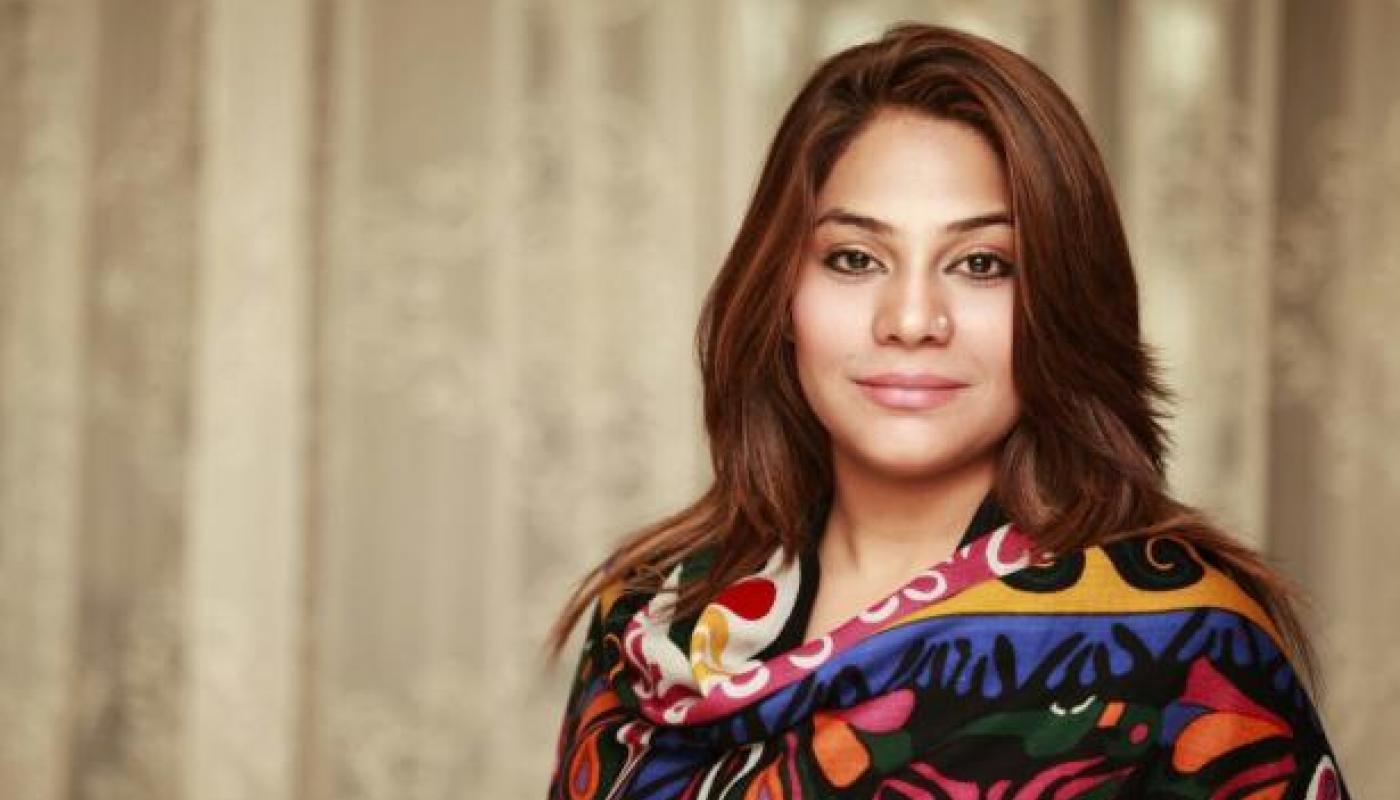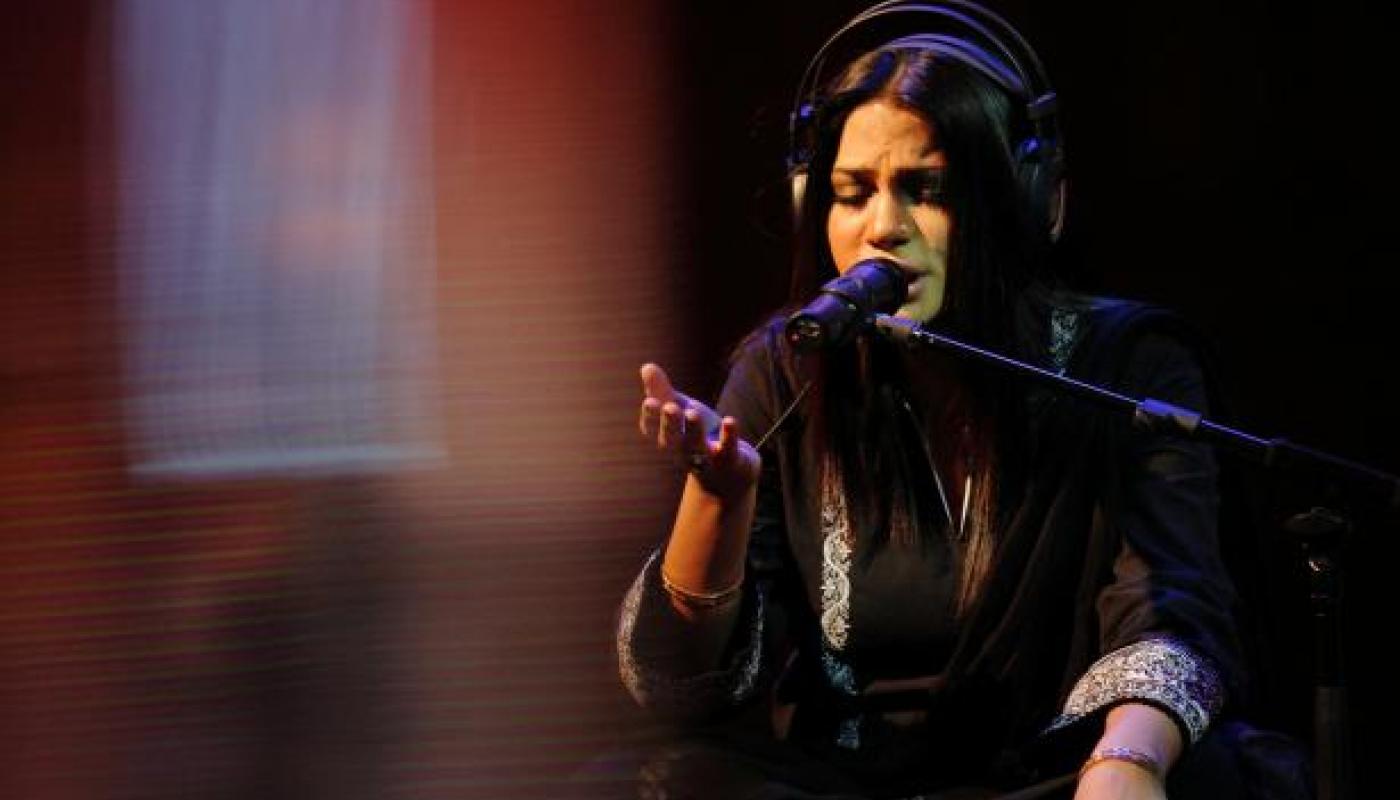
Sanam Marvi



Vocal warrior Sanam Marvi is the next, great diviner of South Asia's humanist, folk, and Sufi texts
With compelling interpretations that draw deeply from one of the world’s great music traditions, Sanam Marvi is Pakistan’s next, inspiring diviner of South Asia’s humanist, folk and Sufi texts. A vocal warrior for tolerance, spirituality and peace, this contemporary daughter of interior Sindh can urge with sweeping clarion calls or disarm with nuance. “Deeply resonant. Sublime. Transporting.” (The International News/Pakistan)
Videos
Brilliant renditions [from Sanam Marvi]. A timeless and legendary voice.
Express Tribune, Pakistan
Press
Dawn Icon Interview: Song of the Nightingale
Dawn Images: On the Road with Pakistani Folk Singer Sanam Marvi
The News: Rafi Peer's Mystica Music Sufi Festival
Desi Blitz: The Popularity of Pakistan Sufi Music
background
Transcendent Message: Pakistan’s Sanam Marvi Offers Compelling Interpretations of South Asian Vocal Masterpieces
“Our lives have become so fast-paced that people feel an emptiness within and are searching for inner peace,” says Sanam Marvi, the young and brilliant vocal interpreter of South Asian spiritual, folk, and classical poetry. “There is comfort to be found in the wisdom of Sufis, and in the couplets on divine love and devotion of our great poets.”
An in-demand performer too rarely heard outside émigré circles, Sanam Marvi will make her first extended tour to major venues in the U.S. as part of Center Stage Pakistan, in the Spring of 2017, a development she welcomes. “I simply want to spread the beauty of Sufi kalam [poetry] to all corners of the world,” she notes. “I want everyone to hear the message of Islam and truth.”
Backed by an acoustic ensemble of South Asian instruments (sitar, harmonium) and percussion (tabla, double-headed dholak drum), Marvi will perform pieces from across Sindh and Punjab, drawing on centuries-old poetry penned by and in praise of the saints and sages who lived and made music in the region. Their shrines are still central to the provinces’ cultural and musical lives.
Marvi’s performance of these pieces balance immediacy and ornamentation, lending new light to a well-loved South Asian repertoire of sufi, ghazal, qawwali, and folk songs. She can urge with sweeping clarion calls or beckon with nuance. Her voice possesses an intense beauty even those less familiar with her mastered genres can feel, as international performances at notable venues like Paris’s Theatre de la Ville, Morocco’s Fes Festival of Sacred Music, and Toronto’s Aga Khan Museum attest.
“Sufi poetry and Sufism are about humanity, love, peace,” reflects Marvi. “It’s connecting people beyond all borders and boundaries. You don’t have to come from an Islamic tradition to get it. It’s a message for all human beings to share.”
Born in 1986, Marvi hails from the small city of Hyderabad, in Sindh. By the age of 7, she began singing with her father, Faqir Ghulam Rasool, during festivals and ceremonies held at shrines throughout Pakistan’s Sindh and Punjab provinces. Female performers are fairly common at these festivals, but Marvi’s voice stood out for its range and clarity. She continued her studies under noted gurus, including Ustad Fateh Ali Khan at the Gwailor gharana (school).
Now a rising star across the subcontinent, Marvi made a breakout performance on Pakistan national television in 2009. Her powerful and revelatory interpretations of the sub-continent’s mystics reach across cultural borders and generations to offer solace in our uncertain and often troubled times.
Stardom aside, a sense of service permeates Marvi’s approach to her music, as well as the repertoire itself. “When I’m on stage, I’m oblivious to my surroundings,” she says. “But I want to transmit the message I’m receiving from my Lord faithfully to my audience.”
One of Marvi’s signature pieces, “Tere ishq nataya” (“Your Love Makes Me Dance”), a masterpiece by 18th-century Punjabi Sufi light Bulleh Shah, beautifully presents this dynamic of loving devotion and service. “Bulleh Shah was dismissed by his teacher and he was heartbroken,” explains Marvi. “He knew his teacher loved dance, so he learned to dance. He wrote this poem about that devotion, that his love for his teacher brought him to dance and earn love in return.” Like all Sufi poems, it suggests divine connection via more mundane, deeply emotional interactions.
Marvi’s interpretations -- she sings in Urdu, Sindhi, Punjabi, and Saraiki -- transcend the ordinary as well, drawing listeners from outside the cultural world of the South Asian Sufi saints into their message. “Vocal music across cultures shares many attributes; people shouldn’t feel intimidated musically,” she insists. “It’s great to understand the poetry, but that’s not the most important thing. If you come with an open heart, we will connect.”
Cultural catalyst, writer, performer, activist, and advocate Arieb Azhar will travel with Sanam Marvi’s party on tour to lead a series of off-stage activities including panel discussions, master classes, and workshops. As a cultural translator of South Asia’s poetics and musics, Arieb’s humanist approach shares common ground with Sanam’s. “True music is the union between the individual and the universal; a release, rapture, celebration, quest, lament of the human spirit. If I am able to touch that in moments of my life, I consider myself fortunate!”
Sanam Marvi
Sanam Marvi, vocals
Kashif Ali, Tabla
Imran Ali, Harmonium
Shahid Ali, Sitar
Noor Bux, Dholak
Arieb Azhar, Guest Artist
2017 program notes and bios
Sanam Marvi
accompanied by
Kashif Ali, tabla
Imran Ali, harmonium
Shahid Ali, sitar
Noor Bux, dholak
Arieb Azhar, guest artist
About the Program
Sanam Marvi, hailing from the province of Sindh, is one of the leading exponents of Sufi music in Pakistan. Sufism is often described as the mystical or esoteric side of Islam, but Sufis themselves would say that Sufism is the essence of all religion that focuses on connection with the Divine positive life force and service to all humanity regardless of religion, creed, class or color. To establish this connection Sufis of several orders often feature music and dance in their ceremonies which are considered to have a healing effect on all listeners, even those who are not familiar with the meaning or cultural context of the poetry.
Pakistan has a long tradition of Sufi poet-saints, many of whom have also been musicians and music innovators in their own right. Their poetry preaches the message of love, faith and devotion to humanity, can be found in all the indigenous languages of the country, and has always been at odds with the rigid exclusive interpretation of religion by the clerical class.
The message of these poet-saints has been kept alive and invigorated over centuries by the musician bards found throughout South Asia, who pay homage to the poet-saints by performing at their shrines. Besides memorizing and internalizing the poetry itself, musicians are also expected to have an in-depth knowledge of North Indian-Pakistani classical music theory. Indeed, all North Indian and Pakistani classical music traces its origin to Hazrat Amir Khusrau (1253–1325), a great musician, music innovator, and poet, who was the disciple and successor of Hazrat Nizam uddin Auliya (1238 – 3 April 1325) the head of the Chishti order of Dervishes.
Repertory for this performance will be announced from the stage.
Lyrics in translation of a few of the songs follow below as an entry point into this work.
Chhaap Tilak Sab Chheeni
Poetry by Hazrat Amir Khusrau
In praise of Saint Hazrat Nizam uddin Auliya
You took away my looks, my identity, with just a glance
By making me drink the wine of love’s furnace
You intoxicated me with just a glance
My fair delicate wrists with green bangles
Are held tightly by you with just a glance
I am being colored by you, Oh my cloth-dyer
And sewed to yourself with just a glance
Khusrau gives his life to Nizam
You made me your bride with just a glance
Man Kunto Maula
Poetry by Hazrat Amir Khusrau
In praise of Hazrat Ali, the most exalted spiritual successor to the prophet Muhammad (Blessed be his Name) according to the tradition of most Sufi orders. The song form, called tarana, is a play of sounds with words such as ‘heart’, ‘I and you’ and ‘Ali the most exalted’
Whosoever accepts Me as Master
Ali is his Master also
Dar dil dar dil dar dani
Hum tum tanana nana
Tana nana re
Yalali yalali yala yalali
Yalalalali yalalali yala yalali
Mahi Yaar Di Gharoli
Poetries by Sachal Sarmast, Bulleh Shah, and Shah Hussain
The unity of existence is the founding philosophy of Sufi saint and language polymath Abdul Wahab (1739-1829), who adopted the name Sachal Sarmast “true ecstatic” for his poetry. The humanist philosophy of Bulleh Shah (1680–1757) is among the most well-known poetries of South Asia. Shah Hussain (1538-1599) is considered a pioneer of the Kafi form of Punjabi poetry. In Sufi symbology, the vulcanization of the clay pot in the fire is compared to the vulcanization of the human spirit in the tribulations of life.
I fill this earthen vessel with love for my Beloved
I fill this earthen vessel with love for my Lord
I fear only the wrath of Allah
I fear only the wrath of my Lord
You are All, I am naught
My heart flickers like an image
Reflected off the well's surface
Wherever I look I see only You
Bulleh cannot see himself
I seek the perfect guide
I seek the mentoring guide
I am the founding vision
Sachal, all is light Divine
I seek companionship with Ali and the saints
I fill this earthen vessel with love for my Beloved
I fill this earthen vessel with love for my Lord
May the spinning wheel keep turning
May she who weaves live long
She who discerns the fine thread from the coarse
Yaar Ko Hum Ne Jaa Baja Dekha
Poetry by Hazrat Shah Niyaz (1742- 1834)
I saw my beloved in everything
At times revealed, at times hidden
At times possibility at times imperative
At times ephemeral at times eternal
Inspired by the wish to see himself
He made himself in every form
He is the one who sees and hears
I saw no other than him
Laughing gleefully through blooming flowers
Crooning in the nightingale's melodic songs
He took the forms of both candle and moth
And annihilated himself in his own flames
At times claiming "I am the Truth"
Witnessed his head raised on the stake
O’ Niyaz, he was beyond the bounds of `You' and `I'
Yet I see him in every `You' and `I'
At times behaving in unfamiliar way
At times recognizing his familiar face
At times an emperor in his glory
At times with a mendicant's begging bowl
At times a devout worshipper
At times a drunkard with tavern companions
At times as a lover like Niyaz
Beating his breast and heart aflame
Tere Ishq Nachaya
Poetry by Bulleh Shah
There is a story that Bulleh Shah (1680-1757), the Punjabi poet, humanist, and philosopher, was once shunned by his teacher Shah Inayat. To win back the heart of his teacher, Bulleh Shah learned the art of dance, which he knew Shah Inayat to be fond of. He then returned dressed in dancing robes and sang these verses to his teacher, who immediately took him back under his tutelage.
Your love makes me dance like mad
Your love made its home inside me
I filled the cup of poison and willfully drank
Come my healer before I die
Your love makes me dance like mad
The sun is hidden, only its glow persists
I offer my life for a glimpse of you
Forgive my forgetfulness when you called, beloved
Your love makes me dance like mad.
The peacock calls in this grove of passion
My beloved is my Qibla (direction) and Kaaba (holiest place)
You made me lost and inquired not
Your love makes me dance like mad
Bulleh Shah sits at Shah Inayat’s door
It’s you who has dressed me in green and red
Where I strike my heel I find thee, beloved
Your love makes me dance like mad
Laal Meri Patt
Poet(s) unknown
The most widely sung Sufi song from Pakistan, this ecstatic number is from the tradition of Qalandari Dhamaals, dancing songs in praise of Syed Muhammad Usman Marwandi (1177–1275), popularly known as Laal Shahbaz Qalandar, ‘Red Eagle Dervish,’ and Mast Qalandar, ‘the ecstatic dervish,’ whose own poetry was in praise of Hazrat Ali – the spiritual founder of three out of the four original Sufi orders.
The shrine of Laal Shahbaz Qalandar, built in 1356 in the city of Sehwan in Sindh province, was bombed by criminal extremists on February 16, 2017. 88 people were killed in the blast; hundreds more were injured. At 3:30am the next day, the custodian of the shrine took his designated place, stood amidst the remains of the carnage, and rang the first bell of the day.
My beloved Laal, keep this connection strong
My swaying dervish my generous dervish
Who comes from Sehwan
Who comes from Sindh
Damadam Mast Qalandar
Ali is in every breath
The four lamps (of your spiritual lineage) burn forever
I will burn the fifth
O’ my guide thy shrine is exalted
Songs are played in rhythm with the clock
Ghanan Ghanan sounds your drum
The clock strikes in beat
Damadam Mast Qalandar
Ali is in every breath
About the Artists
Sanam Marvi was born in 1986 in the small city of Hyderabad in Sindh, Pakistan. By age seven, she began singing with her father, Faqir Ghulam Rasool, during festivals and ceremonies held at shrines throughout Pakistan’s Sindh and Punjab provinces. She continued her studies under noted gurus, including Ustad Fateh Ali Khan at the Gwailor gharana (school). Her breakout performance on Pakistan’s national television in 2009 made her a rising star and since then her persuasive and revelatory interpretations of the subcontinent’s mystic and humanist poetries have crossed cultural borders and generations to offer solace in our uncertain and often troubled times. She has toured widely around the world, and has been featured many times on Pakistan’s popular Coke Studio. She is the subject of Marvi: The Mystic Muse, a documentary by Tanya Panjwani (2016), which has been screened at festivals in Toronto and Pakistan. Follow Sanam Marvi at https://www.facebook.com/sanamarviofficial/
Arieb Azhar A musician, cultural catalyst, writer, activist, and advocate, Arieb Azhar will introduce Sanam Marvi’s performances, and participate in off-stage activities including panel discussions, master classes, and workshops. As a cultural translator of South Asia’s poetries and music, Arieb’s humanist approach shares common ground with Sanam’s. “True music is the union between the individual and the universal; a release, rapture, celebration, quest, lament of the human spirit. If I am able to touch that in moments of my life, I consider myself fortunate!” Follow Arieb Azhar at https://www.facebook.com/ariebazhar/
Sanam Marvi’s US tour March 23-April 18, 2017 includes engagements in Storrs CT, Boston MA, Houston, TX, Brooklyn NY, Savannah GA, Chapel Hill NC, Ann Arbor MI, and Washington DC. For more information visit www.centerstageUS.org
Center Stage Staff
General Manager
Lisa Booth Management, Inc., Deirdre Valente, Lisa Booth, Alexis Ortiz
Robert W. Henderson, Jr. Production Manager
Stacey Boggs, Company Manager
Special thanks to Arieb Azhar for his lyric translations and contextual information contained in these notes.



